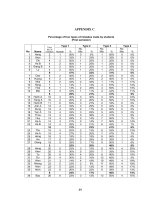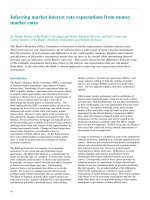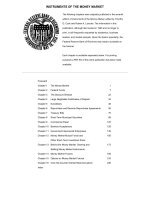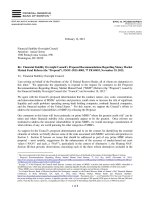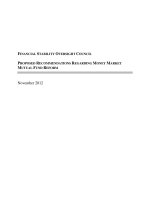Money market Foreign Trade University
Bạn đang xem bản rút gọn của tài liệu. Xem và tải ngay bản đầy đủ của tài liệu tại đây (353.56 KB, 25 trang )
Week 2: Introduction
Lecturer: Dr. Phan Tran Trung Dzung
Group’s members:
Phạm Duy Hưng Đào Phương Nam
Phạm Hà My Phan Lê Quang
Trần Thị Huệ Nguyễn Hà Cẩm Anh
• Definition and fact
Contents
Đào Phương Nam
Phan Lê Quang
• Effects
Phạm Hà My
• Causes
Phạm Duy Hưng
1. What is the purpose and reason for the existence of money markets?
•
•
The point is to facilitate the lending and borrowing of money on a short-term basis.
The meaning of money for money market purposes is not confined to bank notes but includes a range of
assets that can be turned into cash at short notice.
•
Some individuals will invest in the money market for the same reason. A business or government will lend or
borrow funds in the money market
1. What is the purpose and reason for the existence of money markets?
•
The money market is important for businesses because it allows companies with a temporary cash surplus to
invest in short-term securities.
•
In contrast, the companies with a temporary cash shortfall can borrow the funds or sell securities on a shortterm. Money market operations as a short-term fund treasury.
2. Identify the main instruments that are traded in money markets?
•
The most popular money market instruments are eurodollar deposits, negotiable certificates of deposit
(CDs), bankers acceptances, Treasury bills (T-bills), commercial paper, municipal notes, federal funds and
repurchase agreements.
•
T-bill: when the US government needs borrow funds, the treasury frequently issues short term securities
known as treasury bills.
•
Commercial paper: is a short term debt instrument issued only by well-known, creditworthy firms that is
typically unsecured.
2. Identify the main instruments that are traded in money markets?
•
NCDs: Negotiable certificates of deposit are certificates issued by large commercial bank and other
depository institutions as a short term source of funds.
•
Repurchase agreement: with a repurchase agreement, one party sells securities to another with an
agreement to repurchase the securities at a specified date and price.
2. Identify the main instruments that are traded in money markets?
•
Federal funds: The federal funds market enables depository institutions to lend or borrow short-term funds
from each other at the so-called federal funds rate.
•
Banker’s acceptances: a banker’s acceptance indicate that a bank accepts responsibility for future payment.
Banker’s acceptances are commonly used for international trade transactions
3. Who would participate in money markets?
•
Institutions that participate in the money market include banks that lend to each other and to large
corporations in the eurocurrency and time deposit markets.
•
Companies that raise their money by selling commercial paper into the market, after that it can be bought by
other companies or funds.
•
Individual investors who purchase bank CDs as a safe place to put money in the short term.
3. Who would participate in money markets?
•
The government in U.S issues Treasury bills (T-bills) in the money market, and the bills have extremely short
maturities that range from a few days to one year.
•
State, county and municipal governments also issue short term notes.
4. How would the authorities employ money markets for policy purposes?
Government’s economic objectives include:
- Low unemployment
- Low inflation
- Economic growth.
4. How would the authorities employ money markets for policy purposes?
By using monetary policy, governments can control money supply to affect economic conditions:
- Open Market Operations
- Affect All Interest Rates
- Adjusting the Reserve Requirement Ratio
- Adjusting the Fed’s Loan Rate
5. What are the similarities and differences between the domestic money markets and the
international money markets?
6. Provide a list of the key agents, institutions and instruments that comprise capital markets.
•
•
Instrument : stock, share, bonds, government securities, Commercial loans and consumer loans
Agents and institutions:
7. What is the main purpose and function of capital markets?
•
Capital markets are generally long-term or indefinite financial markets. Unlike money market instruments,
capital market instruments are mature for a period of one year or more.
•
It includes financial institutions such as ICICI, IDBI, UTI, IDBI, etc. These organizations play the role of
lenders in the capital market meanwhile companies commonly are borrowers in the capital market. The
capital markets comprise several tools that can be used for financial transactions. For example, stock
markets enable long-term debt and equity to finance at government and company level.
7. What is the main purpose and function of capital markets?
Functions and purposes of capital market :
•
•
•
•
•
•
•
Mobilization of Savings
Capital Formation
Provision of Investment Avenue
Speed up Economic Growth and Development
Proper Regulation of Funds
Service Provision
Continuous Availability of Funds
8. Who are the principal investors in capital markets and why?
•
•
The principal investors in capital markets are institutional investors
The main reason is that capital markets are defined as markets in which money is provided for periods longer
than a year.
•
The individual investors or shareholders tend to be more risk averse than capital market investors
9. What are the advantages and disadvantages of existence of a secondary market for both
lenders and borrowers in capital markets?
Advantages:
•
•
The secondary market provides the liquidity for the existing securities.
On the secondary markets, there is no limit on the number of times a security can be traded, and the process
is usually very quick.
•
•
A chance to save and at the same time invest.
The management of listed company in the stock exchange has to be proficient at its operation, better than
private companies.
9. What are the advantages and disadvantages of existence of a secondary market for both
lenders and borrowers in capital markets?
Disadvantages:
•
•
Prices of securities in the secondary market are easily affected by external factors.
The secondary market doesn’t provide funds to the initial issuer of securities.
10. Explain how capital markets play an important role in the economy.
The role of capital markets:
- Mobilizing savings: The capital market mobilizes capital from people to invest in the production sectors of the economy.
Accordingly, the Equity Market triggers the ideal financial resources and puts them into the right investments.
- Capital formation: By mobilizing the ideal resources, it will generate savings; These savings will be used for agriculture,
industry, ...
- Provision of Investment: Capital Markets increase resources over a long period of time. Thus, it offers a reasonable return on
investment for investors as well as a reasonable investment for those who want to invest.
10. Explain how capital markets play an important role in the economy.
- Speed up economic growth and development: Capital markets help in
research and development, thereby increasing productivity and productivity in the economy by creating jobs and developing infrastructure.
- There are also roles such as setting appropriate regulations,
increasing the liquidity of funds or providing services such as loans…
=> Therefore, Capital Markets play an important role in the development of the economy. It acts as an important link between
savers and investors.
So there is a vibrant and advanced capital markets that will not only help us make the most of our financial resources but also have access to foreig
n capital.
Questions & Answers
Work cited
Adams, D (2017). “The Advantages of Secondary Markets”, Bizfluent. Available at: />Akrani, G (2010). “What is Capital Market? Meaning, Functions and Role”. Kalyan City Life. Available at: http://
kalyan-city.blogspot.com/2010/09/what-is-capital-market-meaning.html
“Capital Market”. Investopedia, b. Available at: />“Capital Market”. Wikipedia. Available at :
Jason Van Bergen. “Getting To Know The Money Market”, Investopedia, b. Available at: />
Work cited
Kumar, R (2014). “Strategies of Banks and Other Financial Institutions: Theories and Cases”. Elsevier Science Publishing Co Inc.
Madura, J (2013). “Financial Markets and Institutions”. (3rd ed) Canada.
“Money Market”. Investopedia, a. Available at: />“Money Market Instruments”. Inc. Available at: /> R.F.G. Alford, Robert Vincent Roosa, Hugh T. Patrick, Christiaan Glasz. “Money Market”, Britannica. Available at: />
Thank You !
Thinks different!
www.themegallery.com

